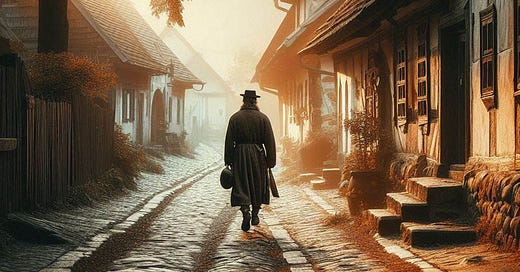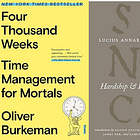Sing the Melody of Freedom
Freedom requires responsibility, and to preserve freedom, we must sing its song.
You might recall from our study of Bonds That Make Us Free that C. Terry Warner was heavily influenced by Martin Buber’s I and Thou. Buber was also largely responsible for reintroducing Hasidic teachings to a modern audience.
Noted religious scholar Andrew Harvey explains that the Hasidim believe that hesed “the “bliss-fire of Divine Love, underpins the whole of the universe and is boundless like the heart it streams from forever.”
Harvey explains that since the Hasidim know the nature of God is to give infinitely, they try to empty themselves “so as to be filled with the divine passion of compassion and blaze with its rapture and hunger to serve all beings in the Real.”
Last month, I heard the following tale on YouTube told by Rabbi David Ingber during his congregation’s livestream Yom Kippur service. The story has the feel of a 19th century Hasidic teaching tale.
Although Hasidic teachings have influenced Rabbi Ingber, I do not know the origin of the following tale he told:
“Moshe was a man of unwavering habit in a small Jewish town in Eastern Europe. He lived with his wife Rachel, their two sons and daughter, and his faithful dog.
Every morning Moshe’s day was as predictable as the rising sun. He would wake up precisely at 5:00 AM. He would stretch his arms, he would yawn, he would dress, and shuffle into the kitchen where two eggs, a piece of toast, and a cup of strong black coffee awaited him. With his meal completed, he would glance at the clock, noting it was just 6:00 AM.
As was his routine, he would turn right out of his door and walk down the cobblestone path, arriving at his small shop exactly at 6:30 AM. Once there, he would unlock the door, set up for the day, and begin work. At 5:30 PM on the dot, Moishe would close the shop, lock the door, and turn left to go home, arriving promptly at 6:00 PM every day without fail.
This was Moshe’s rhythm, like the tick-tock of a well-wound clock.
Days turned to weeks, and weeks turned to months and years, with each one beginning and ending exactly the same way–until one fateful day, Moshe broke from his habit.
It was the end of a long workday, and Moshe decided to make a right turn out of his shop instead of his usual left. For the first time he took the path through the woods. He strolled deeper into the forest. The air was thick with earthy smells and whispers of rustling leaves. And then a sound drifted towards him, a melody gentle and otherworldly. It was so beautiful that Moshe closed his eyes; he let the music fill his mind and heart.
It guided his steps as he ventured further into the forest. Through the trees, he saw the flickering light of a tiny fire surrounded by teeny figures all dancing in rhythm and song. They were unlike anything he’d ever seen; with shimmering cloaks and twinkling eyes, they moved to the melody in graceful, small steps.
Just as Moshe felt himself lost in their music, he heard a sudden snap; the figures disappeared leaving only the still silent trees behind him. The beauty of that melody haunted Moshe. He couldn't let it vanish like a dream.
As he tried to make his way back home, he realized he was lost in the woods. In desperation, he began to hum the melody and closed his eyes, trusting it to guide him home. When he finally arrived much later than usual, Rachel was waiting anxiously by the door.
“Moshe, Moshe, where have you been?” she cried, scanning his face for answers. Moshe looked at her and opened his mouth and sang the melody. He couldn't speak, he could only sing. The once orderly, reliable man of habit now communicated solely through this strange, beautiful song.
Rachel was at her wit’s end. She asked everyone for help—the butcher, the baker, the local merchant, even the town's wise old woman. But no matter who came to him, Moshe only answered them with the melody sung from somewhere deep inside of him.
Months passed. His shop began to suffer. His customers came asking for things they needed, only to be met with his haunting melody. His neighbors and friends grew concerned. His children puzzled over their silent father. And Rachel, poor Rachel, though deeply worried, grew exhausted from asking question after question with no reply.
Eventually the townspeople took Moshe to the rabbi. Sitting across from the rabbi, Moshe closed his eyes; he filled his lungs and began singing the song again. The rabbi listened, silently letting the melody sink into his heart. Finally, he said, “Moshe, if you can't find your voice soon, we'll have to send you far away to get help. So please, Moshe, if you can and if you want to stay, just tell us.”
Moshe’s heart ached to respond to tell his story, but when he opened his mouth to speak, he could only sing. Rachel and the townspeople began to raise money to send Moshe to a distant town to get him the help he needed.
Soon, the day of departure arrived. The townspeople gathered at the train station, whispering goodbyes to Moshe as he still sang his melody.
At the last moment, just as he was about to board the train, his little daughter tugged at his sleeve and pleaded, “Please, Papa, don't leave.” Moshe bent down, wanting desperately to reassure her, but again, nothing but music.
As the conductor shouted all aboard, Moshe turned to take one last look at his family and neighbors. Just then, someone from the crowd began to hum Moshe's melody. Then another voice joined, and then another, until the entire crowd—his family, his friends, his community—was singing the song together, the melody rising and falling in harmony.
Moshe stopped and suddenly he found his voice. “That was beautiful,” he exclaimed to his wife who was clutching her heart.
“Moshe, you can speak at last,” cried Rachel.
Moshe explained the music was too precious, too beautiful, to let it slip into oblivion: “I couldn't write the melody down and describe it in words. I only knew that it had to be sung, shared, and learned by others so that it would live on.”
The melody was no longer his alone; it belonged to the entire community. In that little town, Moshe’s melody became part of their traditions. It was sung at gatherings and celebrations and passed down from parent to child.
Moshe, the man of habit, had left his mark. His song, the one that came to him in the hidden depths of the forest, would never be forgotten.”
Like other Hasidic teaching tales, this one packs a universal and powerful lesson that we can apply to our own place, time, and needs.
There are those now gone and those still among us who have sung powerful melodies teaching us about the conditions under which individuals and societies flourish.
Will we sing what they taught, or will we send them away?
Soon President Trump’s second term will begin. Perhaps he will carry through on his promises. Perhaps RFK Jr., Elon Musk, and other fresh faces will have important roles. There will be powerful voices in Congress telling the President it is dangerous to upset business as usual.
If we think political leaders can save us, we are wrong. Like all human beings, they are imperfect; if we agree with freedom’s melody, we must sing it.
RFK Jr. can’t feed us unprocessed foods and exercise for us. Freedom requires responsibility, and to preserve freedom, we must sing its song.
Big Pharma doesn’t spend all that money on television ads for no reason. They know what any doctor can tell you: most people would rather take a pill than change their habits.
Some parents would rather trust their children’s teachers than examine what their children are learning.
A sick, ignorant, frightened population will never be free. The future of freedom depends on our choices.
Your paid subscription enables essays like this one and gives you access to Mindset Shifts U. Seneca’s “On Anger,” “On the Shortness of Life,” and Oliver Burkeman’s Four Thousand Weeks are coming to Mindset Shifts U in December and January.






Absolutely loved this tale! Very much like Frost's "The Road Not Taken" which has stuck ta me all my life--but I liked the haimish twist and that all joined in--in song. The songs & stories we pass along ARE who we are--they've gotten many've us this far--come rain 'er shine (oy, let's hope 2025 brings more shine--no guarantees....)
Also I never heard of this Renewal synagogue even tho' my older daughter swam at the 92nd St Y every week an' we attended so many events there! (What goes on under yer nose, eh?) I had ta look inta this rabbi--I'm intrigued an' never heard of this "Renewal" effort (except far outside the faith on commercials fer leather upholstery treatments ha ha)
Fwiw, I grew up Reform an' apart from havin' some of the most stunnin'ly borin' instructors that would'a been better applyin' wallpaper paste than teachin' children (their history & torah instruction would'a put even the Eveready Bunny ta sleep! so sad what I'd missed out on....) --there were exactly FOUR things I loved about Sunday school & temple--1. the songs--our Cantor was so good he got invited ta join the Met opera so we lucked out with a living "Jazz Singer" amidst us--AND we also sang each week 2. the shows (we put on 2 holiday plays/ year plus purim skits--musicals too), an' 3. our "middle school" ballroom dancin' classes (too short lived! "tri temple cotillion lol") and 4. last but not least, he STORIES like this'un!
Despite lackluster teachers we had two great rabbis that were both wonderful story tellers-- every
"sermon" had one good story (some as moral tales but always colorful, often "starring" a fool who was not so foolish!)--AND years ago I found an'nuther storyteller I adore, arguably even better than rabbis--a sage herself! Professor Ruth Wisse--she has the "knack!" Such a delight--look 'er up--free lit. classes on Yivo too.
So it was the stories that held me--prayers, no so much, the rest...feh. Indeed, we LIVE by stories! They (imho) kin change hearts & minds more than lectures, pleadin', bribes, or even consequences... THIS was a good one! (Off ta check out the story-teller now!)
Thank you for Moshe’s story.